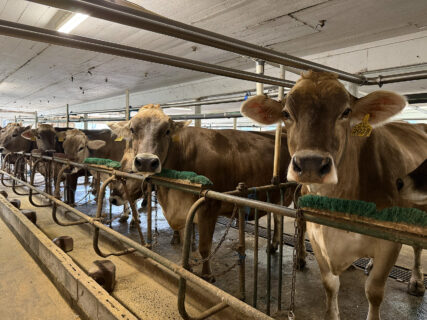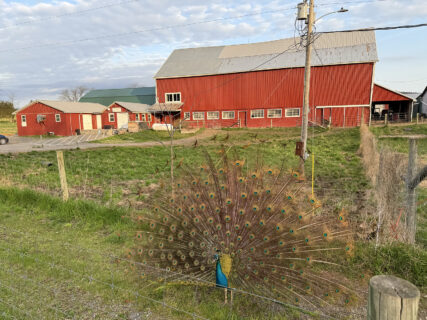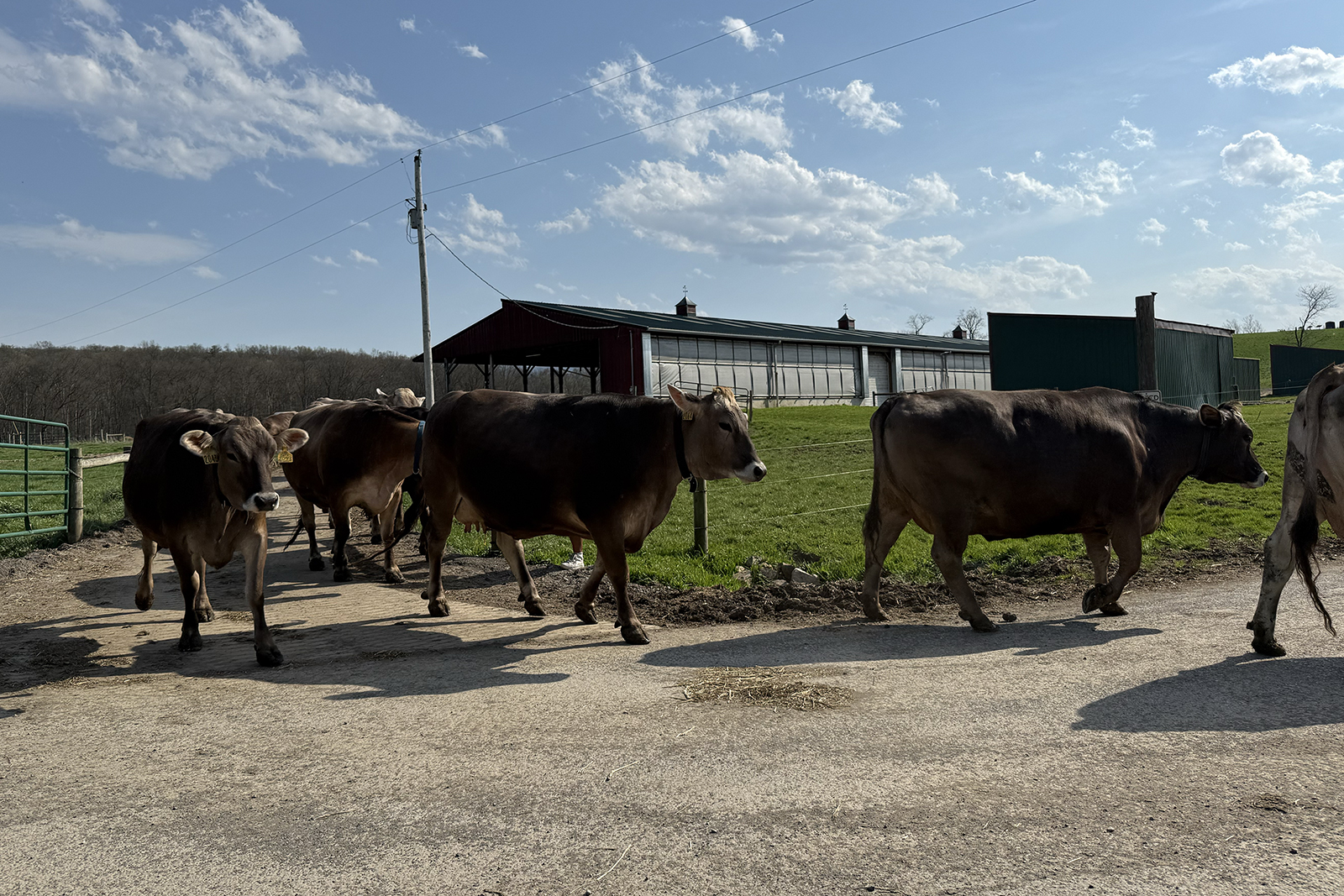
PORT ROYAL, Pennsylvania (RNS) — On a quiet Sunday on rural Pennsylvania farmland, Dhruva and his favorite cow, Tabby, meet at dawn. While one recites a mantra to Lord Krishna using prayer beads, the other listens to religious chants as she’s milked. But they’re joined together at breakfast — both enjoying a sattvic, or spiritually pure vegetarian meal of organic produce sanctified by God before consumption.
Cows on the Gita Valley dairy farm outnumber humans by about 5 to 1, but the 20 full-time human residents prefer it that way.
“They’re like big dogs that like to run up to you and try to eat your hands or something,” said the commune’s head chef, Madhupan. Parijata, Dhruva’s wife, called the cows “friends, but also living entities that make a contribution and deserve our respect.” (As initiated members of the International Society for Krishna Consciousness, or ISKCON, the residents of the farm, besides eschewing illicit sex, intoxication, meat-eating and gambling, use only one name.)
Of Tabby, the “mascot of the herd” that has been producing milk for the longest among the cows, Dhruva simply said, “She’s a grain thief.”
On this farm and creamery run by Hindu devotees and modeled after a traditional Indian gaushala, or cow sanctuary, the only one of its kind in the United States, both soil and soul are cultivated with God in mind. The 102 rescued bovines on the 430-acre property roam free, providing emotional support to their human companions as well as fresh milk.
In line with the owners’ belief system, Gita Valley is the first USDA-certified dairy farm that refrains from violence against its cows. They aren’t dehorned, poked, prodded, bred, branded or confined in any way, and the cows are not sent to market (“a sanitized term for slaughtered,” said Dhruva) after they can no longer produce milk, as they are at most U.S. dairy farms.
The 16 female cows who are able to produce each give 400 gallons a week — more than average — a fact Dhruva attributes to the principle that “when we’re happy, when we’re taken care of, we’re willing to give more.”
ISKCON adherents believe cows are the ultimate mothers — providing protein, nutrition and sustenance and asking for nothing in return. Gita Valley’s priority, Dhruva said, is not profit but for rescuing the animals from a capitalist culture that forces cows (and their farmers) into exploitation.
“It’s very clear from the Vedas that humanity as a whole is suffering today as a result of the slaughter of cows,” he said, referring to sacred Hindu texts.
Dhruva, 52, the farm’s president, and his wife, who goes by PJ, gave up successful careers in South Africa (“I was promoted,” said Dhruva, who worked as an engineer) to move to Port Royal in 2009. Devoting their lives to Krishna, the blue-skinned deity and cowherd whom ISKON members consider the Supreme Lord, they adopted a dietary regimen free of meat, onions, garlic, caffeine or any other spiritually disruptive ingredients.
They moved onto the farm founded in 1974 by Swami Prabhupada, ISKCON’s founder, who had named the land Gita Nagari, or “land of the Bhagavad Gita,” Hinduism’s holiest book, so Hare Krishnas, as ISKON followers are known, could live out their faith without worldly distractions.

Dasya milks cows at Gita Valley dairy farm, Saturday, April 19, 2025, in Port Royal, Penn. (RNS photo/Richa Karmarkar)
The project, now rebranded as Gita Valley, was started with four Brown Swiss cows and innumerable peacocks — “a headache for the plants,” said Dasya, the head gardener.
Ashok Dudakia, one of the swami’s original 12 disciples, describes the guru as having “tears in his eyes” when he arrived in the U.S. in the late 1960s and saw how Americans treated their cows.
“He said, ‘how can I educate these people on nonviolence?'” said Dudakia. “Actually it’s not nonviolence, it’s just etiquette. We are the supreme species, God has given us that, and we should be taking care of animals, not mistreating them.”
Dhruva said a growing ethical veganism movement, whose adherents may consume animal byproducts if the source is guaranteed to be non-exploitative, has been increasing demand for Gita Valley’s dairy products, evidenced by Gita Valley’s waitlist of hundreds of hopeful consumers.
The farm’s operation is nonetheless mostly funded by weekend retreats organized by a third party, which brings almost 3,000 people a year. Other revenue comes from milk subscriptions (price: $18 per gallon) from nearby ISKCON temples, the farm’s gift shop, “Mootique,” and undergraduate work-study programs. (One eager Gen-Zer created a viral TikTok video that led to 1,200 applications for the program’s 54 spots.)

Dhruva, from left, Ashok Dudakia and his wife Rekha visit outside the Gita Valley Mootique Sunday, April 20, 2025, in Port Royal, Penn. (RNS photo/Richa Karmarkar)
Outsiders can “adopt” or “rescue” a cow through regular donations; the latter allows donors to name a cow and participate in a cow puja, or Hindu blessing.
Drawing larger investors is a challenge, said Dhruva. Even though “there’s still this romantic idea of farming,” he said, it’s hard to find individuals willing to contribute to the farm’s mission even though they are likely to see competitive returns.
The gardener, Dasya, 35, an initiated Hindu monk who came to live in Gita Valley in 2019, observed that farm life is “always a battle between living simply and wanting more.” He admitted, “It’s tough sometimes to keep the vision, because in the immediate it might seem like, ‘What are we doing out here?'”
“When you’re here, you really see how dependent you are on a higher force, because you don’t know what’s gonna happen,” he said. “The wind could come and take out the greenhouse, take out your crops. You’re more connected to nature, and that ultimately brings you closer to knowing and acknowledging that there’s something higher.”
Yet he regards living on the farm as part of a “spiritual revolution” that makes him able to thrive “separated from the man.” The neighboring Mennonites who trade produce with him, said Dasya, admire the Hare Krishna farmers’ “pure, unmotivated love of God, without distraction of material wealth,” something, they tell him, their own communities could stand to work on.

Devotees perform a ritual honoring Lord Krishna’s favorite plant, the tulsi, center, at dawn on the Gita Valley property’s Radha-Damodara Temple, Sunday, April 20, 2025, in Port Royal, Penn. (RNS photo/Richa Karmarkar)
Madhupan, the farm’s vegan chef (and Dasya’s fiancé) lived in Wellington, New Zealand, in an ISKCON community before joining Dasya, whom she has long been dating, about a year and a half ago. Madhupan sees people outside ISKCON moving toward a more conscious, plant-based diet.
“Many are not in a proximity where they can purchase dairy that comes from places like this,” said the chef, who notes “sadly” that she lacks the enzymes to properly digest dairy. “But it’s really a consciousness thing, being like, ‘Okay, where does my milk actually come from? It doesn’t just come from Weiss or Wegmans. It comes from the cow. And what’s the consciousness of that living entity?'”
Preeti Sharma, a pediatrician who visits the farm with her two teenagers every month and lives there part time, goes a step further, saying even vegan milk is produced from the living entities of trees: “It’s not so much about who’s better, a vegetarian or a non-vegetarian,” she said, as much as bearing in mind that we are what we eat. “We are trying to work on our consciousness, and food is a fundamental part.”
Ashok Dudakia’s daughter, Kunti Salazar, a frequent visitor from her Washington-area home, is raising her two young daughters in the ISKCON tradition. She hopes the love she has cultivated in them for the farm’s cows (and its smell) will be passed on to the next generation.
“Whenever you see Krishna as a cowherd boy with cows, they’re always in an open pasture, free roaming,” she said. “Coupling Krishna’s pastimes with the actual experience of being on a farm with cows made it real for me and made me fully understand why Krishna was so passionate. They have such sweet energy, and they’re so giving of themselves. I just think they’re really misunderstood in American culture — like just cattle, or a product.”
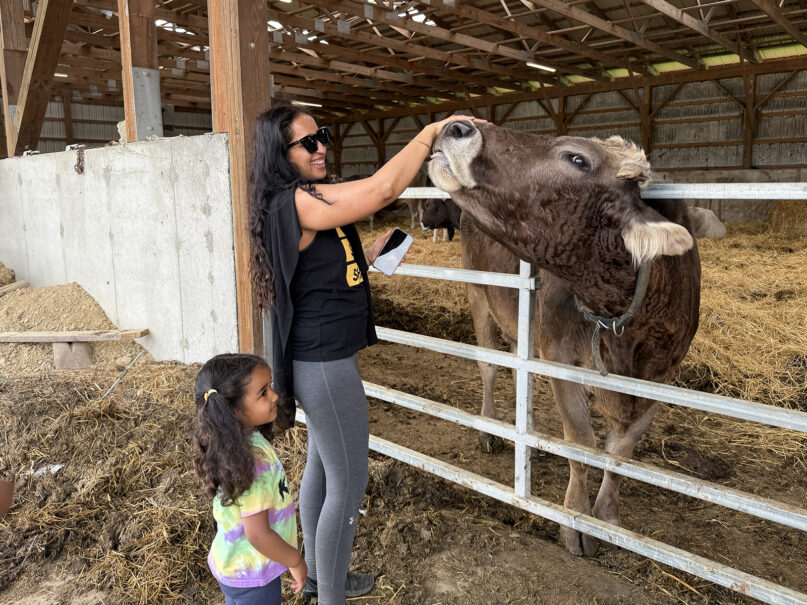
Kunti Salazar, with her 3-year-old daughter, Kashi, pets a cow at Gita Valley dairy farm, Saturday, April 19, 2025, in Port Royal, Penn. (RNS photo/Richa Karmarkar)
Dudakia, who lives in California, visited the farm’s temple to pray for the growth of the farm before he departed for his flight home. He is planning to open an Ahimsa Dairy shop on the West Coast, he said, to expand their reach. “They need serious help, and we have to do something now,” he said.
Dhruva said he also prays to Krishna, asking that new money will come in from Hindu temples in the United States that reflect the Hindu American community’s wealth. About an hour away by car is Vraj Temple, one of the largest Hindu houses of worship in the nation.
“A lot of people grew up in India and tell me, ‘We always had a family cow, I remember milking the cow,'” he said. “But when they come here, they forget very quickly. The idea is that in one sense, Krishna will make some arrangements, but we don’t want to leave it all to him to do. So we’re taking some practical steps to search out succession.”
Sharma, the pediatrician, believes that all that’s needed is for more people to visit and “get a real taste:” both of the non-violent milk and of the healing nature of Gita Nagari.
“Here, you live every day,” she said. “In the outside place, you pass days to live later. Gita Nagari is a place where you can come with all your worries, sit with the cows, and they’ll lick it all out of you.”
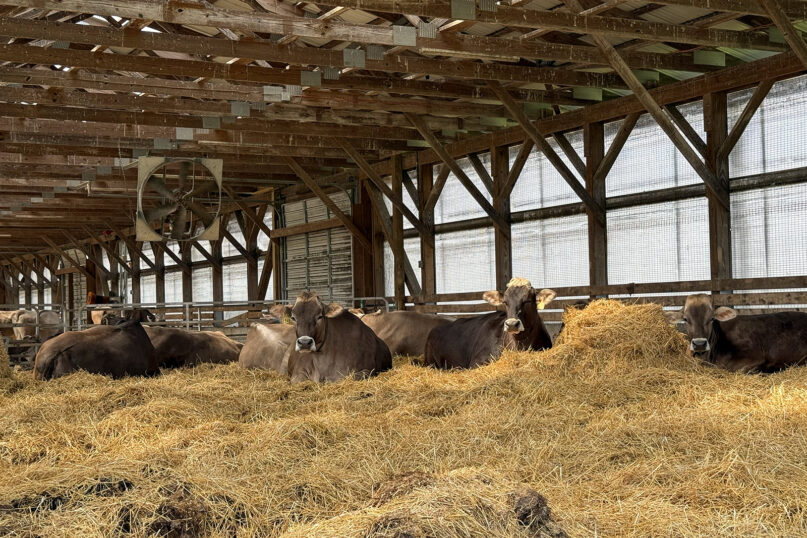
Cows lie on straw in a barn at Gita Valley dairy farm, Saturday, April 19, 2025, in Port Royal, Penn. (RNS photo/Richa Karmarkar)

